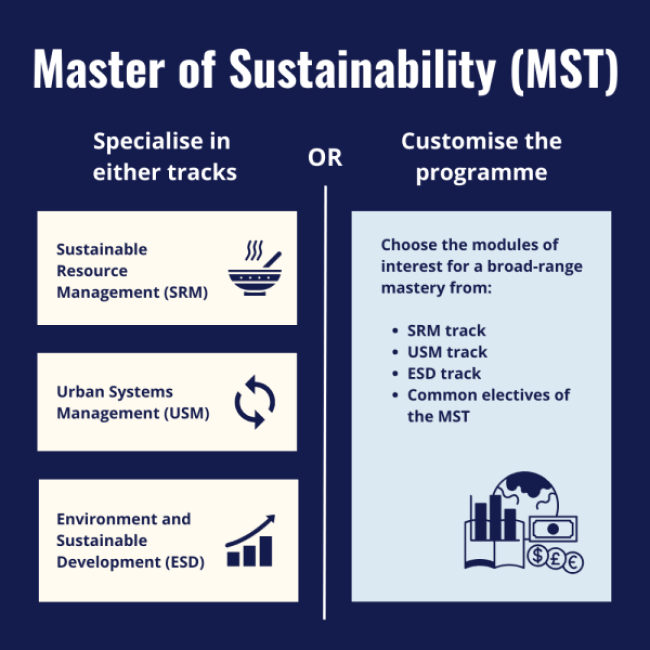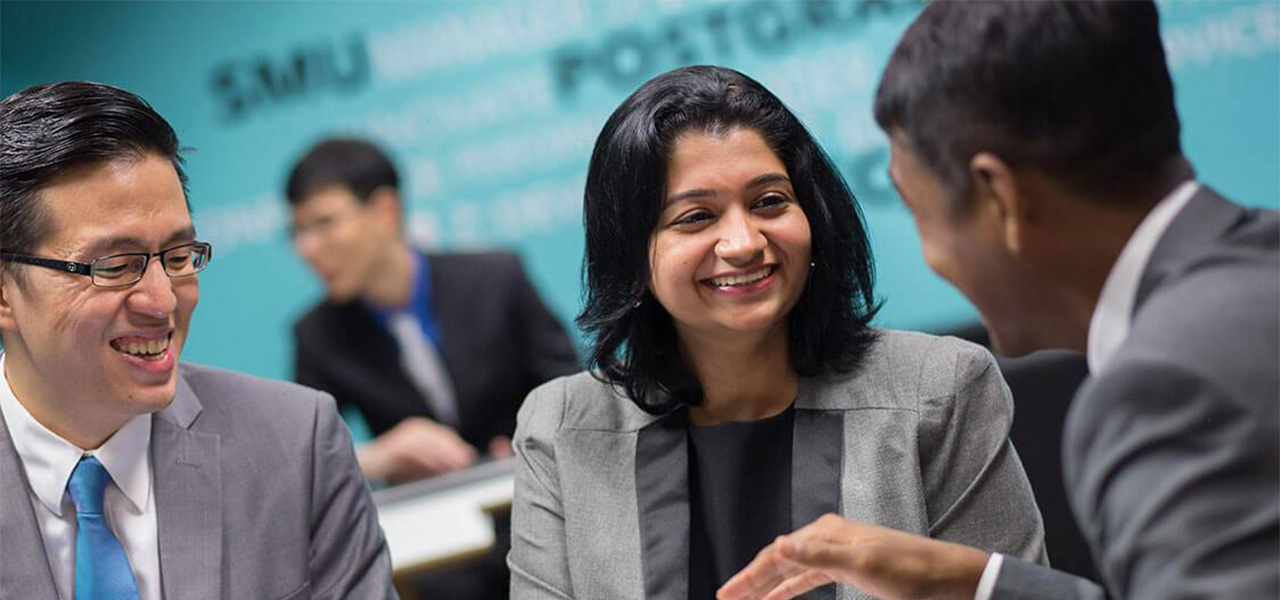Amid a backdrop of global challenges, such as climate change, depleting natural resources, and deepening social inequality, decision-makers and innovators worldwide are presented with an opportunity to spearhead changes in the way resources and energy are used.
Launched in September 2023, the Singapore Management University (SMU) Sustainability Blueprint underscores the University’s contribution to sustainable living on both local and global scales. Advancing 13 out of 17 of the United Nations’ Sustainable Development Goals (SDGs), the Blueprint has birthed multiple award-winning initiatives—from solar harvesting to improving the energy efficiency of the University’s buildings.
The SMU Sustainability Blueprint will help chart SMU’s actions towards a sustainable future across four key strategies.
Among the strategies, ‘Develop Change Agents Through Sustainability Education’ aims to guide future initiatives of the University’s transformative curriculum. It is designed to cultivate leaders and change agents who can weave sustainable development principles into their professional lives, address sustainability issues competently, and be proactive global citizens.
The recently launched SMU Master of Sustainability (MST) programme is one of the courses that prepares students for jobs in the green economy. A first–of–its kind at SMU, the programme blends the expertise of academics across the School of Social Sciences (SOSS) and the College of Integrative Studies (CIS). It delivers an interdisciplinary curriculum that aligns with industry needs, while empowering students with the skills needed to adapt to the ever-evolving sustainability sector.
The programme offers three thematic tracks that students can choose to specialise in to deepen their acumen in the green economy.
Sustainable Resource Management
Managing natural resources for future generations is vital as global ecosystems are increasingly strained by a growing population and complex environmental challenges. This requires developing and implementing practices that ensure the judicious use, conservation, and protection of natural resources for long-term sustainability.
The first thematic track in MST, Sustainable Resource Management, zeroes in on these challenges, especially in the areas of agriculture and food system (mapping into SDG 2), renewable energy (SDGs 7 and 13), and water management (SDGs 6, 13 and 14).
Students will investigate the socio-political relations and environmental impact in various aspects of the food system, dive into the conversion principles and technologies behind renewable energy sources and examine the underlying political issues and policies that shape water management.
“The relevant modules under this track are developed by the faculty from SOSS, whose expertise emphasises the societal, political and policy implications of these topics, alongside the foundational knowledge of these sectors,” shares Dr Ishani Mukherjee, Associate Professor of Public Policy at SMU’s SOSS and the Programme Director of MST.

Urban Systems Management
Rapid urbanisation has driven over 55 per cent of the world’s population to reside in cities. By 2050, that figure is projected to rise to 70 per cent. The speed and scale of urbanisation bring with it a host of pressing challenges, from intensifying pollution levels to unsustainable land-use practices.
The Urban Systems Management (USM) track is designed to nurture the next generation of urban sustainability professionals. By taking core courses in “Business and Climate Change”, “Principles of the Circular Economy” and “Urban Sustainability”, students will gain in-depth insight into the challenges associated with SDGs 8, 9, 11 and 12, and develop an understanding of effective mitigation strategies. Classes will focus on imparting the translatable skills needed to thrive in the green economy, including, but by no means limited to, managing the decarbonisation transition, climate resilient development, risk reduction in cities, and the policy negotiations that stem from the IPCC reports, UNFCCC and Article 6. At the end of the degree, the USM track will equip students with the knowledge and skills needed to thrive in a range of urban sustainability careers spanning both the public and private sectors.
Environment and Sustainable Development
Sustainable development entails meeting today’s needs without compromising those of future generations. Achieving this balance calls for policymakers to leverage innovative business models, equitable economic structures, and inclusive growth strategies, all of which are crucial in ensuring that wealth is acquired sustainably and made accessible to every segment of society.
SMU MST’s Environment and Sustainable Development track presents an internationally timely bird’s-eye view of global sustainability trends, encompassing areas such as social entrepreneurship, environmental economics (SDG 8) and social development and growth (SDG 1). These modules aim to provide students with a holistic perspective on the matter.
Through this track, students will learn about the social enterprise ecosystem in Asia and how it operates, the causes and solutions to environmental problems from an economic perspective, and seminal and cutting-edge theories related to understanding development and poverty.
“This track is the most interdisciplinary among the three offered, combining expertise from the Lee Kong Chian School of Business (LKSCB), SOSS, and CIS,” emphasises Dr Mukherjee.
Preparing for a future in the sustainability sector
The interdisciplinary nature of SMU’s MST programme, interwoven with the thematic tracks, equips graduates with a comprehensive skill set, shaping them into the change agents needed to address the multifaceted challenges of sustainability.
“In designing these three thematic tracks, we wanted to ensure we provide the most wide-ranging perspective on sustainability,” says Dr Mukherjee, highlighting the breadth and inclusivity of the programme.
She also emphasises that MST students can opt to specialise in one of the thematic tracks or select their preferred modules and complete the programme without a specialisation.
“It is important not to create silos, leading students to feel that the curriculum is too specific in any one area. This is so that they can apply their knowledge across a broad range of career paths after graduating from SMU,” adds Dr Mukherjee.
“Sustainability as an issue is industry-agnostic, so we want to ensure that the core skills built through the programme are applicable across various sectors.”
Ready to embark on a transformative journey towards becoming a sustainability leader? Explore the possibilities with SMU's Master of Sustainability programme. Use promo code SMDFEB24 to enjoy a waiver of application fee when you apply before 29 Mar 2024.





